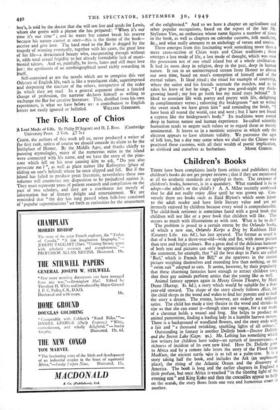A Lost Mode of Life. By Philip D'Argcnti and H.
J. Rose. (Cambridge University Press. 2 Vols. £7 7s.) ios, the authors of this work tell us, never produced a writer of he first rank, unless of course we should concede its claim to be the irthplace of Homer. By the Middle Ages, and thanks chiefly to punning etymologies, many of the numerous ruins in the island were connected with his name, and we have the story of the pine- cone which fell on his nose causing him to ask, "Do you also persecute me ? ", as well as place names like Kolosyrtes (place of eliding on one's behind) where he once slipped and fell. But if the island has failed to produce great literature, nevertheless these two volumes will counteract any disposition to be prejudiced against it. They must represent years of patient research and compilation on the part of two scholars, and they are a storehouse not merely of information but of literary delight and entertainment. We are reminded that " the day has long passed when folk-lore consisted of `popular superstitutions ' set forth as curiosities for the amusement of the enlightened." And so we have a chapter on agriculture and other popular occupations, based on the report of the late Mr. Stylianos Vios, an enthusiast whose name figures a number of times in the book, as well as chapters on calendar customs, folk medicine, &c., and what really amounts to an anthology of verses and stories.
There emerges from this fascinating work something more than a mere cross-section of Chian ways and Chian traditions ; there emerges a lost mode of life, a lost mode of thought, which was once the possession not of one small island but of a whole civilisation. It had its roots deep in religion, deep in the past, deep in human nature. It ran in an uninterrupted stream from Homer to almost our own time, based on man's conception of himself and of the eternal values. It liked ritual ; the ritual for example of courtship, where the suitor and his friends serenade the maiden, and as he takes his leave of her he sings, " I give you good-night my thick- growing laurel ; my feet go forth but my mind stays behind." It liked to associate life with poetry and poetry with life, delighting in complimentary verses ; exhorting the bridegroom " not to wither the sweet stock we have given him " and reminding the bride, " I have been all round the world, east and west ; but I have not found a cypress like the bridegroom's body." Its traditions were rooted deep in human nature and human experience. So-called scientific humanism tends to negate such values or to regard them as merely sentimental. It leaves us in a monistic universe in which only the electron appears to have ultimate validity. We patronise the ages of folk lore, but a day may come when we shall see the Chians who practised these customs, with all their wealth of poetic implication, as civilised and ourselves as barbarians. MONK GD3BON.














































 Previous page
Previous page